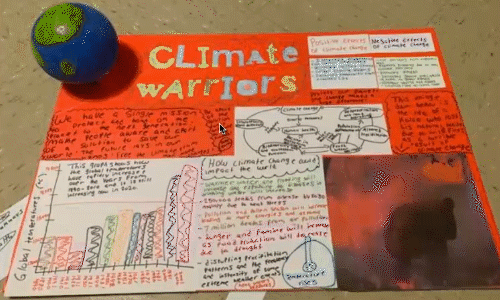How Catalyst helped South Bronx, NYC Science Teacher Sherry Tom get students back into (virtual) science class
If you’re a parent or teacher, you’re probably familiar with the many challenges of remote learning. Sherry Tom, earth science teacher at Hostos Lincoln Academy of Science in Bronx, NY, is both, doing her best to support her students while sharing a workspace with her husband and two elementary school kids. “At school, my kids are led from one activity to the next. When learning from home, they’re expected to navigate Google Classroom on their own because I’m working and their dad is working.”
While remote learning isn’t working well for most students, it’s working wonders for some, which shows that grades can improve dramatically with a shift to project-based learning contextualized as potential solutions to real world problems. When schools suddenly closed last March, Sherry knew she would need to find an engaging and academically rigorous, project-based virtual curriculum. She signed up for our Virtual Climate Science Unit, a shortened, fully remote version of the Catalyst program we created in immediate response to COVID-19. This unit allows students to create their own public service announcement (PSA) in the format or medium of their choice. Sherry recognizes student choice as a key lever of engagement and learning, and appreciated the flexibility when guiding students through their projects. “I wanted someone to make a TikTok video but none of them did,” Sherry says with a laugh.
Watch this amazing final project from Amir, one of Sherry’s 8th grade students.
One student, Amir, went a level beyond that to produce his own PSA video about climate change in NYC, which not only showcased his research abilities, but also an impressive talent for storyboarding and video editing. “Amir is so sociable—when he was in the classroom, he could not stop performing for his peers. His mom is very engaged and he’s very bright, but he wasn’t focusing and he was not performing to his potential. But he was able to really focus when we went remote. We actually had a number of students that did so well when away from distractions.”
Another one of Sherry’s students created this 3D poster as well as a two-page synthesis and reflection of his learnings.
Another student had always been quiet and disengaged while in class before the pandemic. But when he sent Sherry a photo of his Catalyst project, she was stunned. He had created a 3D poster about NYC climate change, presenting more information and deeper analysis than she had ever expected. Sherry proudly shows off the poster, bringing attention to the reflections where, “he even talks about how he doesn’t ask for a straw when he goes to the corner store to buy soda now. I mean, all of these things are really amazing because this child never spoke. He just sat in class and I’d never know if he was paying attention. I was pleasantly surprised because the spring was so rough and I lost so many kids despite making daily phone calls.”
While those logging into Sherry’s virtual classes are fully engaged, the reality is that many of her 140 students are still not attending virtual classes, and several have an “incomplete” from last year. Guidance counselors at Hostos Lincoln are calling parents daily, but some say it’s impossible to force their children to engage in remote learning, especially if they don’t find it interesting. In addition, the South Bronx was hit particularly hard by the first wave of the pandemic. “A lot of my kids actually lost family members because of COVID. Many of them don’t have parents who have work-from-home jobs. There’s food insecurity, they’re moving around a lot. In the spring, I delivered so many care packages, just basic supplies, hygiene items—all of this is important because they can’t learn if they’re not sure about where they’re living or where their next meal is coming from.”
While schools in underserved communities across the country continue to work on student attendance and basic needs, Sherry’s success with her previously disengaged students shows that project-based, experiential learning opportunities connected to the real world can improve student engagement. But Sherry’s known this all along. “Look, I teach science and kids love labs, period. Before the pandemic, when they came in and saw that the room was set up for a lab, they were so happy. Kids love doing things, there’s no question about it. And they always want to know, why are we learning this?”
Thanks to many generous donors, including All Points North Foundation’s generous gift of $60,000 for the 2020-21 school year, we can support NYC teachers like Sherry and provide meaningful and engaging learning opportunities for students throughout the city.


